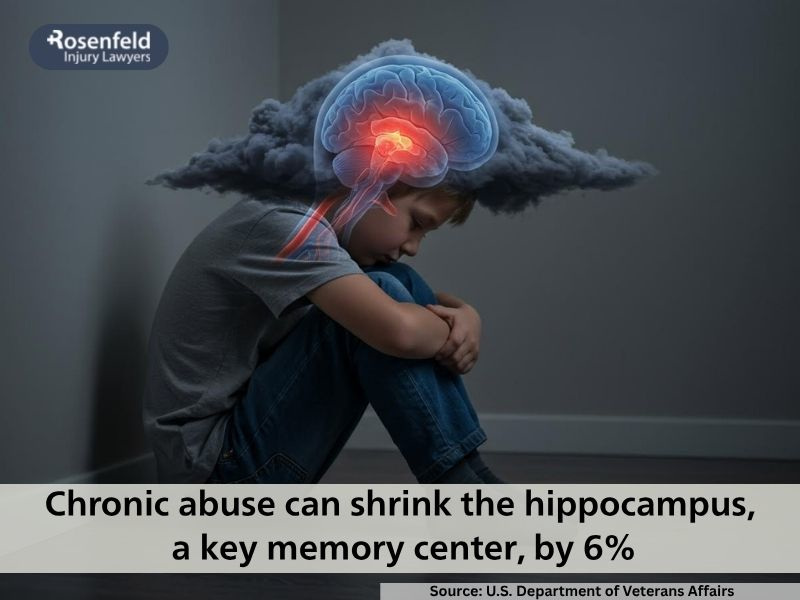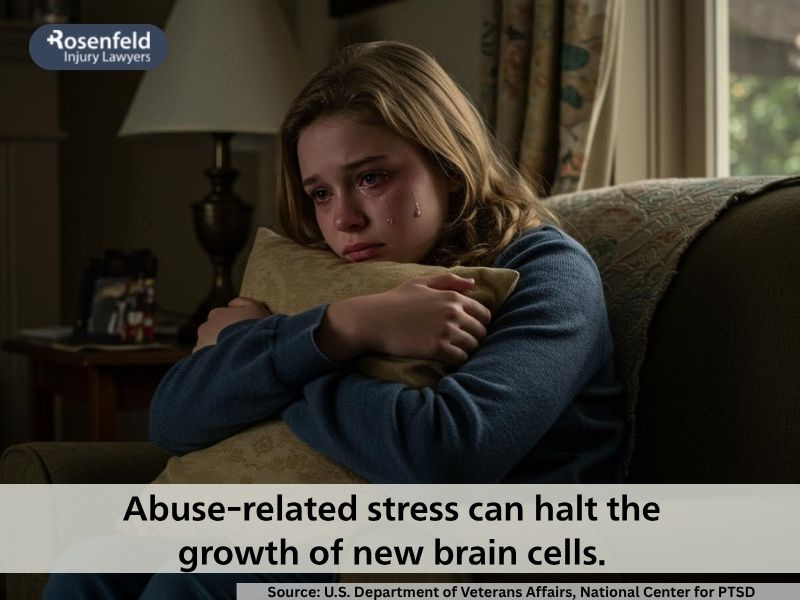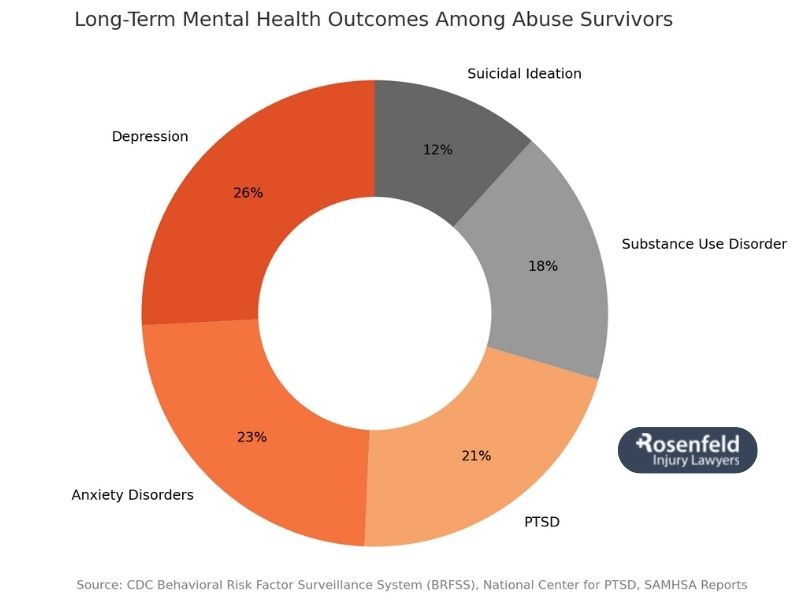How Abuse Affects the Brain
At our firm, we’ve seen firsthand that the impact of abuse is not always visible. Scars may fade, but the effects can live on within the mind and body. How abuse affects the brain is something researchers, clinicians, and survivors continue to uncover together, and what science shows is powerful.
Abuse and neglect, especially in early childhood, can alter how the brain develops, affecting emotional regulation, memory, and even physical health. These changes don’t mean someone is “broken,” rather, they reflect the body’s effort to survive overwhelming experiences.
Our goal in this article is to help survivors, loved ones, and advocates understand these changes and to offer hope that healing and recovery are absolutely possible.

What Types of Childhood Maltreatment Can Lead to Brain Changes?
It is estimated that one in four children will experience child abuse or neglect at some point in their lifetime. Each form of early maltreatment, whether emotional, physical, or involving exposure to violence, can disrupt the brain’s natural growth patterns. These experiences shape adult brain structure, stress response systems, and the regulation of emotions.
From our experience working with survivors, we’ve seen that trauma doesn’t follow a single pattern. Some people may develop heightened vigilance and anxiety, others may feel detached or struggle to process emotions. These are not signs of weakness but rather adaptive responses from a developing brain trying to protect itself from overwhelming harm.
Below, we explore how different types of abuse and neglect affect the mind and body and why early support and intervention matter.
Emotional Abuse and Neglect
Emotional abuse and emotional neglect often leave no physical marks but can have the deepest psychological consequences. Studies show that children who endure chronic verbal abuse, criticism, humiliation, rejection, or a lack of affection display structural and functional changes in several brain regions, including the prefrontal cortex and amygdala, areas responsible for regulating emotions, decision-making, and stress response.
For example, a child who is constantly told they are worthless or ignored when they express fear or sadness may struggle to form a stable sense of self or to recognize emotional cues in others. These early disruptions can lead to psychiatric disorders, mental health problems, and emotional balance later in life.
We’ve spoken with many survivors who describe feeling “numb,” “on edge,” or unsure of how to trust others. Those are all natural outcomes of a brain that adapted to survive in an unpredictable environment. Over time, such early life neglect can weaken connections between the prefrontal cortex and limbic system, altering how individuals process and respond to emotions, often leading to depression, anxiety, or personality disorders in young adults.
Physical Abuse and Neglect
Repeated physical abuse and physical neglect can significantly affect the brain’s motor skills, reward, and stress processing systems. Chronic exposure to violence, such as being struck, shaken, or deprived of basic needs, floods the body with stress hormones like cortisol and adrenaline. When the hypothalamic-pituitary-adrenal (HPA) axis remains overactivated, it can damage brain regions that control fear, impulse regulation, and empathy.
Magnetic resonance imaging (MRI) studies reveal smaller volumes in the corpus callosum (the bridge between the brain’s hemispheres) among children exposed to chronic physical harm. This may lead to abnormal patterns of communication between emotional and logical centers of the brain. Children exposed to violence may become hypervigilant, impulsive, or withdrawn, not by choice, but because their brain systems have been wired for survival, not safety.
Physical neglect, such as inadequate nutrition or lack of medical care, can further disrupt developmental milestones. The developing brain depends on consistent emotional support and positive feedback from primary caregivers. Without these, children often experience negative outcomes like learning difficulties, behavioral issues, or delayed motor development.
Sexual Abuse
Sexual abuse during childhood causes profound psychological and neurological harm. Survivors of sexual trauma often experience long-term effects of childhood sexual abuse, including changes in brain development, altered response to stress, and disrupted regulation of emotions.
Imaging studies suggest that repeated exposure to traumatic events, including sexual abuse, may reduce volume in the hippocampus, a region of the brain critical for memory and emotional processing. This can lead to traumatic memories that feel fragmented or “stuck,” a hallmark of post-traumatic stress disorder (PTSD). Many survivors also show heightened activity in the amygdala, the brain’s fear center, which keeps the body in a state of constant alert.
Clinically, sexually abused individuals may have an increased risk of developing substance abuse, dissociation, flashbacks, or difficulties forming intimate relationships. These are the mind’s attempts to cope with unbearable experiences, not signs of personal failure. Understanding these brain changes helps reduce shame and reinforces that healing requires compassion, not self-blame.
Domestic Violence
Even when a child is not directly harmed, witnessing abuse in the home can have similar neurological consequences. Exposure to domestic violence, such as seeing one parent threaten or harm another, activates the same response pathways as physical abuse.
Children in violent households may show structural and functional changes in areas controlling fear, impulse regulation, and processing rewards. Over time, this can lead to a higher risk of violent behavior, anxiety, and mental illness in adulthood. Research also links chronic exposure to intergenerational abuse, meaning patterns of trauma can echo across generations if left untreated.
We’ve represented many survivors who describe feeling frozen or powerless during violent episodes as children. That “freeze” reaction is not weakness, it’s a deeply ingrained survival mechanism. Repeated exposure to threat conditions the stress response system to remain on high alert, which can later cause physical issues like insomnia, headaches, or gastrointestinal problems, reflecting how deeply trauma intertwines with physical and mental health.
Does Childhood Abuse Affect Brain Structure?
Modern imaging studies confirm that childhood trauma can reshape the brain’s physical structure. According to research from Biological Psychiatry and Child Welfare Information Gateway, chronic abuse and neglect cause measurable structural as well as functional changes in several brain regions.
- Hippocampus: Often smaller in survivors, affecting memory and learning.
- Amygdala: Overactive and hypersensitive to threat, leading to anxiety and fear.
- Prefrontal cortex: Thinner and less active, reducing self-awareness, impulse control, and decision-making.
- Corpus callosum: Decreased integrity disrupts communication between hemispheres, affecting reasoning and emotion.
- Stress systems: Overactive HPA axis causes chronic cortisol release and health issues like high blood pressure, inflammation, and fatigue.
When these regions develop under constant fear, the brain prioritizes survival over growth. That’s why survivors may seem reactive, detached, or emotionally volatile, because their brains learned to protect them.
Neurologically, some signs a child is sexually abused may include extreme fear, regression, nightmares, and dissociation. These behavioral cues reflect brain changes tied to trauma.

How Does Early-Life Abuse Impact Brain Development and Victims’ Overall Well-Being?
Childhood maltreatment doesn’t just alter the brain, it shapes how a person experiences the world. Research from the American Journal of Psychiatry, Child Abuse & Neglect, and the Annual Review of Sociology shows that trauma can affect emotional health, learning, relationships, and physical health throughout life.
Emotional and Mental Health
Survivors often experience an overactive response to stress: the fight, flight, or freeze system stuck “on.” This can lead to psychiatric disorders, mood swings, hypervigilance, or personality disorders. Changes in the prefrontal region and amygdala make it hard to remain calm or process emotions, while the hippocampus struggles to store memories consistently.
Thinking and Learning
Altered brain regions tied to planning and focus can cause concentration problems or “brain fog.” Survivors may have trouble completing tasks, remembering details, or organizing thoughts. Changes in reward processing can blunt pleasure, leading to substance abuse or risk-taking as attempts to feel normal.
Physical Health
The brain’s stress circuits influence the whole body. Chronic trauma increases inflammation and raises the risk of disease, including heart problems, immune dysfunction, and chronic pain. Survivors often experience physical symptoms, such as headaches, fatigue, or gastrointestinal issues, that reflect both emotional and biological distress.
Relationships and Behavior
Children who experience abuse and neglect from primary caregivers may grow up struggling with trust and intimacy. They may fear closeness, repeat patterns of intergenerational abuse, or display behavioral problems as the result of learned survival responses. Some develop violent behavior, others withdraw entirely. These are coping strategies, not moral choices.
Despite these negative outcomes, recovery is possible. With therapy, safety, and emotional support, survivors can rebuild emotional balance and strengthen healthy connections.
Can the Consequences of Childhood Trauma Be Treated?
While trauma can leave lasting changes, the brain’s plasticity allows healing throughout life. Survivors of childhood abuse can regain control and peace through trauma-informed care designed to rebuild safety and emotional health.
Treatment options include:
- Trauma-Focused Cognitive Behavioral Therapy (CBT) – Reframes negative thoughts and integrates traumatic memories into a cohesive story.
- Eye Movement Desensitization and Reprocessing (EMDR) – Uses eye movement to process distress without re-traumatization.
- Dialectical Behavior Therapy (DBT) – Teaches mindfulness, self-awareness, and emotional regulation to manage intense feelings.
- Exposure Therapy – Safely reintroduces triggers to rewire the body’s response to stress and reduce avoidance.
- Family Therapy – Helps repair communication and prevents intergenerational trauma and abuse.
- Medical and Psychiatric Care – Addresses depression, anxiety, and trauma-related physical symptoms.
- Somatic and Body-Based Therapies – Focus on restoring connection between body and mind through movement or breathing.
- Peer and Community Support – Reinforces belonging and recovery through shared experiences.
Therapy doesn’t erase the past, but it helps survivors build new pathways toward safety, connection, and self-trust. The long-term effects of childhood sexual abuse can be lessened with compassion, consistency, and evidence-based treatment.
What Legal Options Do Victims of Child Abuse Have?
After medical and psychological healing begins, survivors often ask: What are my legal options?
Many still have rights, even years after the abuse. Laws in several states now protect survivors through extended filing timelines, recognizing the impact of delayed discovery, when someone only later realizes that their trauma stems from past abuse. These reforms ensure that justice remains possible, no matter how long it takes to come forward.
Civil vs. Criminal Cases
- Criminal cases are filed by the state to punish the abuser. They require proof beyond a reasonable doubt and may lead to imprisonment or probation.
- Civil lawsuits are filed by survivors to hold the abuser or responsible institutions accountable. These abuse lawsuits seek compensation for medical bills, therapy, emotional distress, and lost income.
Even without a criminal conviction, a survivor can still bring a civil case. Civil law recognizes that justice and healing are personal, and every survivor deserves both.
Statute of Limitations and Delayed Discovery
Each state enforces a statute of limitations on sexual abuse and assault, but many have extended or eliminated deadlines for survivors of childhood abuse. Under delayed discovery, the legal clock begins only when the survivor understands that their harm was caused by past abuse. This rule acknowledges that trauma can be buried for decades due to shame, fear, or dissociation.
If you’re unsure whether it’s too late to file, our attorneys can review your situation privately and explain your options.
Institutional Accountability
Abuse often occurs in settings where adults should have intervened, such as schools, foster care systems, churches, medical facilities, or youth programs. In these cases, survivors can hold those institutions accountable for negligence, failure to protect, or cover-ups. These cases seek compensation but also expose patterns of wrongdoing and protect others from harm.

How Injury Lawyer Team Can Help
At Injury Lawyer Team, we understand that coming forward takes immense courage. Our firm has represented survivors across the country in sexual abuse lawsuits involving institutions, organizations, and individuals who failed to protect vulnerable children.
We provide:
- Independent investigations and expert consultations
- Confidential evidence review and trauma-informed communication
- Legal representation for both civil claims and institutional negligence cases
- Guidance through statute of limitations and delayed discovery laws
- Complete privacy and respect throughout your case
Our firm operates on a contingency fee basis, meaning you pay no upfront costs and no attorney fees unless we win compensation for you. We also offer a free confidential consultation to help you understand your rights and next steps.
You are not alone. We believe in every survivor’s right to be heard, to heal, and to seek justice. The effects of abuse may shape your story, but they do not define your future. With compassion, expertise, and persistence, we help survivors reclaim both their voice and their power.
All content undergoes thorough legal review by experienced attorneys, including Jonathan Rosenfeld. With 25 years of experience in personal injury law and over 100 years of combined legal expertise within our team, we ensure that every article is legally accurate, compliant, and reflects current legal standards.








